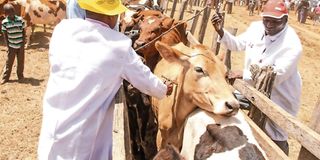Vet on call: Real cost of ignoring animal vaccination

Veterinary officers vaccinate cattle in Uasin Gishu County in this past photo. Vaccination during a disease outbreak is a fire-fighting activity that always ends up with damages that could have been avoided if animals had been vaccinated to prevent the disease at the time when they were healthy. PHOTO | FILE | NATION MEDIA GROUP
What you need to know:
- In addition to diseases controlled and prevented by regular vaccination, there are others that can only be prevented by strict hygiene and biosecurity.
- One farmer from Murang’a wondered why the diseases have come back so soon after the last outbreak.
- Under normal circumstances, FMD and LSD can be effectively controlled if at least 80 per cent of the animal populations in an area are diligently vaccinated.
- My advice to livestock farmers is to organise themselves and discuss with their animal health service providers.
Most farmers believe vaccination should be provided as a public good at subsidised prices by county governments.
They wait for the public services to be delivered but in most cases, they are delivered erratically and out of sync with the disease prevention opportunities.
The result is repeated disease outbreaks and vaccination during outbreaks.
It is scientifically known that vaccination during a disease outbreak is a fire-fighting activity that always ends up with damages that could have been avoided if animals had been vaccinated to prevent the disease at the time when they were healthy.
It is also known that disease control and eradication, where effective vaccines are available, is attained when vaccination programmes are adequately, efficiently and effectively executed at predetermined times.
In addition to diseases controlled and prevented by regular vaccination, there are others that can only be prevented by strict hygiene and biosecurity.
Biosecurity refers to procedures or measures that are designed and implemented to protect the animal population from exposure to harmful chemical and biological substances.
Such measures may include isolation of the farm by animal-proof fencing, disinfectanct footbaths, quarantine of new animals and sick animals and use of personal protective equipment (PPE).
I am writing about this to respond to questions from pig and cattle farmers over the past two weeks. Many of them lamented that foot and mouth disease (FMD) is back in Murang’a.
They said it was just in February and March this year when they were struggling with the disease.
DILIGENT VACCINATION
Others from Murang’a, Nairobi and Kajiado said they have been hit again by African swine fever. One farmer from Murang’a wondered why the diseases have come back so soon after the last outbreak.
Consider two of the most common diseases FMD and LSD. These are viral diseases with very effective vaccines produced locally by the Kenya Veterinary Vaccines Production Institute (Kevevapi).
My experience with these two diseases and scientific evidence is that diligent vaccination controls them very effectively.
Farmers that I have worked with over long periods of time have not experienced the diseases even when their neighbourhoods are burning with outbreaks.
Predictably, farmers who feel vaccination is costly and they could save production costs by witholding the vaccinations soon get to be hit hard.
The infections in most cases begin with apparently mild disease that later become full-blown.
I recall one farmer who had 80 cattle and 500 pigs in Nairobi. For eight years, I had vaccinated the cattle and the breeding pigs against FMD.
He never had outbreaks. In the ninth year, he decided to stop vaccination after calculating all the money he had spent for the previous eight years.
In his business calculations, he failed to factor in the benefits he had gained from the diligent vaccination.
At the end of the year he stopped vaccination and lost 30 cows and 100 pigs to FMD. Many of the remaining animals were unthrifty, with very poor production for six months after recovery.
He closed the farm, citing frustration and the rigour of rebuilding his cattle and pig herds.
Under normal circumstances, FMD and LSD can be effectively controlled if at least 80 per cent of the animal populations in an area are diligently vaccinated.
My advice to livestock farmers is to organise themselves and discuss with their animal health service providers.
They should ensure that farmers in an area, say a ward or even a county, work with one service provider who vaccinates at least 80 per cent of the animals in the area in a diligent programme at all the scheduled times.





